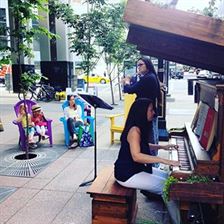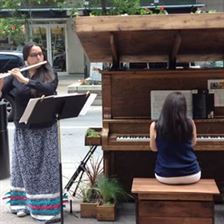Jesse McMann-Sparvier (flute) and Claire Butler (piano) will be opening the Duets! Series of the 2016 season of the Downtown Street Piano Series on Thursday June 2nd at noon at the Woodlands Piano located at 332 6 Ave SW.
I have always loved Mozart, especially his Concerto in G. After hearing it on disc by the Academy of St. Martin-in-the-fields as a child, I have dreamed of performing it. Although it is written for flute and orchestra, I am honored to be performing it with Claire Butler on piano. From the opening notes to the end of the 3rd movement, I am so inspired by the lightness, the playfulness and the melancholy of the concerto. My partner mentioned to me that it sounds like a butterfly in love, and that has guided me in my interpretation of this piece as well. I love, love, love classical repertoire on flute. There are so many amazing sounds written for flute that can be expressed with such individualism by the flutist. I listen to many many recordings. I love hearing student and amateur performance to my personal favorites, Emmanuel Pahud, Marina Piccinini and Jasmine Choi. For me, I connect with classical music in the moments where after hours and hours of practice, and dissecting - reassembling pieces, there are moments when you can disappear and times seems to stop existing. These moments in performance, and in dance as well are the moments I live for and I strive for.
I found the Trail of Tears Concerto before I found “Tracing Mississippi” by Indigenous composer Jerod Impichchaachaaha’ Tate (Which I will not be performing). Trail of Tears was written by Michael Daugherty based on the forced removal of Cherokee, Chickasaw and Choctaw nations in 1830-1850. After seeing the opening quote by Geronimo (Apache) I knew there was something off about the piece but I proceeded to work in it anyways. As an Indigenous person, I find it to be a process of re-appropriation, performing pieces written as either “influenced by American Indian Music” or “Written in the style of American Indian Music” I am re-claiming misinformed works and interpreting them as an actual Indigenous person would. It is hard for me sometimes, to reconcile the written notes from another non-indigenous person, on paper … into my own indigenous soul. It can be challenging, sometimes I get angry, and sometimes I make adjustments of my own because sometimes … the music is so insulting and ridiculous. I am continually seeking repertoire for flute composed by Indigenous musicians, sifting through the tons of compositions using Indigenous source material by non-Indigenous composers.
I am told by other Indigenous people that I am playing the music of the oppressor when I perform classical music, however in researching composer, the music I am drawn to is most often composed by those who’s act of composition is an act of resistance or subversive revolution. Prokofiev was a composer who was a state favorite, and who also had a love for the new composition techniques he had heard in the United States and Jazz from his travels. While he had much pressure from the state to compose great Russian music, his Flute Sonata op.95 is laced with slight jazz influences and new composition styles. I was lucky to spend three months intensely analyzing this sonata for my final theory paper, which led to a different approach and a deep connection to not just the notes on the page, but everything underneath it. I hope that you enjoy the pieces we will be performing.
Editor’s Note: This has been a guest blog post written by Jesse McCann-Sparvier to promote the Downtown Street Piano Series.
Related Posts
| Tweet |
|









